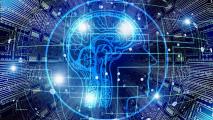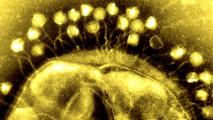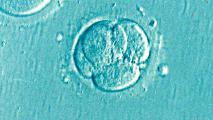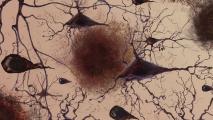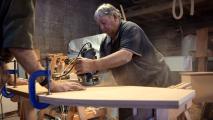
Biotech
Human history has been all but defined by death and disease, plague and pandemic. Advancements in 20th century medicine changed all of that. Now advancements in 21st century medicine promise to go even further. Could we bring about an end to disease? Reverse aging? Give hearing to the deaf and sight to the blind? The answer may be yes. And soon.
More
Personal genetics might solve the opioid crisis – and the pain crisis
Why does pain hurt more for some people? Why do others feel nothing at all?
To eradicate TB, we need old-fashioned ambition
The Ebola outbreak sparked more medical innovation in two years than TB has in decades, even though TB is killing…
Meet the 380 trillion viruses inside your body
Scientists aren’t exactly sure yet what the “virome” is up to, but it’s probably important.
A new kind of headset “hears” words you don’t say
The project, named AlterEgo, intentionally crosses the line between what’s “out there” and what’s in your head.
The 2018 Nobel Prize could mark a turning point in the war on cancer
More than one in three people will be diagnosed with cancer during their lifetime; new discoveries are helping them…
A new stem cell treatment can heal burns, bedsores, and diabetic ulcers
In addition to healing injuries, the approach could be useful for repairing skin damage, countering the effects of…
How the Phoenix is fighting addiction with fitness
Meet the group that is helping thousands of people transform their lives and unlock their potential.
Can science make people live healthier for longer?
An MIT researcher has turned 30 years of aging research into something you can use right now.
Why a third of antidepressants are prescribed for "off-label" problems
The “secret life of antidepressants” could open up a host of new treatments.
Zika could be a “smart missile” for brain cancer
Zika can devastate fetal brains; scientists want to turn it against brain tumors instead.
Brains store memories in a temporary "cache" (and we can read it)
Like the day’s newspaper, the brain has a temporary way to keep track of events.
FDA approves first mute button for genetic diseases
It is the first of “a wave of advances that have the potential to transform medicine.”
Are "CRISPR kids" the new "test-tube babies"?
Forty years later, IVF shows how fears about new technology can fade.
New evidence suggests viruses may trigger Alzheimer’s
For the first time in a long time, there’s a new direction for potential Alzheimer’s treatments.
High tech archaeology found a new way to screen for vitamin D deficiency
Vitamin D deficiency is an age-old problem, but new techniques from archaeology may be the key to catching it early.
Paralyzed mice walk again after breakthrough treatment
One small step for a mouse, perhaps one giant leap for treating spinal injuries.
Coffin-building club helps seniors face death and enjoy life
These seniors are tackling the stigma around death by decorating their own coffins.
UV robots can sterilize an ICU in 10 minutes
UV light destroys bacterial DNA from the inside out, eradicating the toughest pathogens in minutes.
Will probiotics cure cholera?
MIT scientists say eating good bacteria can prevent, cure, and diagnose cholera—cheaply.
Get inspired with the most innovative stories shaping the world around us.













